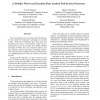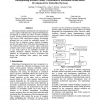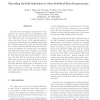RTAS
2008
IEEE
14 years 9 months ago
2008
IEEE
We build on PTIDES, a programming model for distributed embedded systems that uses discrete-event (DE) models as program specifications. PTIDES improves on distributed DE executi...
RTAS
2008
IEEE
14 years 9 months ago
2008
IEEE
Many wireless sensor nodes (motes) interface with slow peripheral devices, requiring the processor to wait. These delays waste time, energy and power, which are valuable but limit...
RTAS
2008
IEEE
14 years 9 months ago
2008
IEEE
The notion of resource reservation for obtaining real-time scheduling guarantees and enforcement of resource usage has gained strong support in recent years. However, much work on...
RTAS
2008
IEEE
14 years 9 months ago
2008
IEEE
Embedded systems are often subject to constraints that require determinism to ensure that task deadlines are met. Such systems are referred to as real-time systems. Schedulability...
RTAS
2008
IEEE
14 years 9 months ago
2008
IEEE
Recent technologies such as the Real-Time Specification for Java promise to bring Java’s advantages to real-time systems. While these technologies have made Java more predictab...
RTAS
2008
IEEE
14 years 9 months ago
2008
IEEE
This paper provides four contributions to the study of optimization techniques for component-based distributed realtime and embedded (DRE) systems. First, we describe key challeng...
RTAS
2008
IEEE
14 years 9 months ago
2008
IEEE
This paper formulates and illustrates the integration of resource safety verification into a design methodology for development of verified and robust real-time embedded systems. ...
RTAS
2008
IEEE
14 years 9 months ago
2008
IEEE
To achieve better throughput, many hard drive manufacturers use internal queues and scheduling to take advantage of vendor-specific characteristics and knowledge. While this tren...
RTAS
2008
IEEE
14 years 9 months ago
2008
IEEE
RTAS
2008
IEEE
14 years 9 months ago
2008
IEEE
Multiprocessor scheduling problems are hard because of the numerous constraints on valid schedules to take into account. This paper presents new schedule representations in order ...





